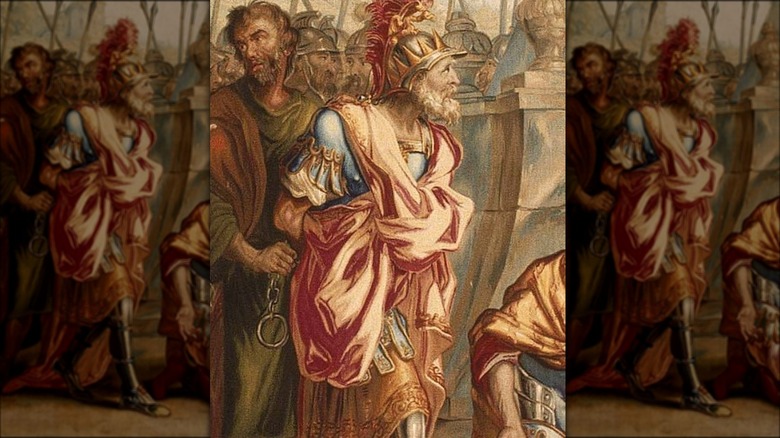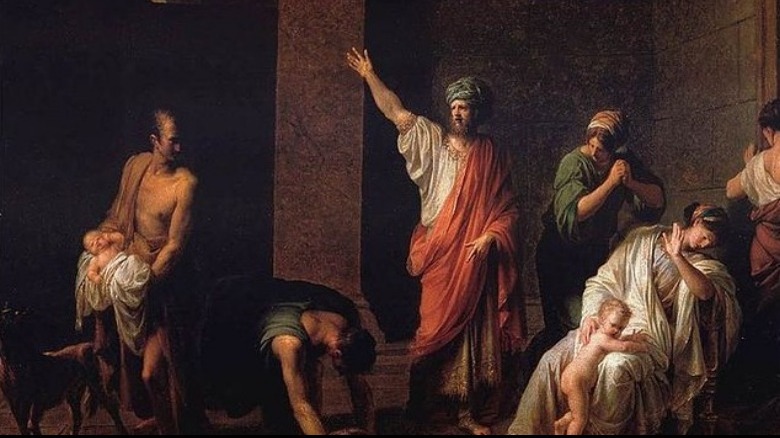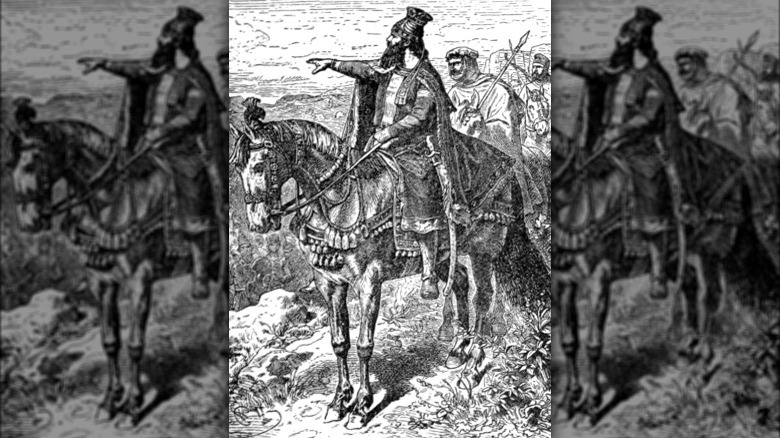The Shocking Myth Surrounding The Birth Of Cyrus The Great
If there's one thing ancient history teaches us it's that, when you're king, you really have to watch your back. Nowhere is this more true than in the story of King Astyages, the last ruler of the Median empire. Astyages' dominion spanned what is now Azerbaijan, Kurdistan, and some parts of Kermanshah, per Britannica. He ruled around the 6th century B.C., and as The Historian Shut explains, one night Astyages had some weird dreams — two dreams to be exact. That's according to what is now thought to be a highly embellished account of what happened by the Greek historian, Herodotus, from his work, "The Histories," written decades later (via Ancient Origins).
Though we can't be certain of the true story of Cyrus, later known as Cyrus the Great, Astyages' dreams described in graphic detail certain intimate behaviors of Astyages' daughter, as Herodatus later wrote. The Median king and his Magi advisors interpreted those dreams to mean the offspring of Astyages' daughter, Mandane, named Cyrus, who was Astyages' grandson, would one day conquer his grandfather and rule the kingdom. Like any good monarch, Astyages was not about to let that happen, so naturally — as far as these ancient stories sometimes seem to go — King Astyages arranged to have his grandson killed. Though according to Herodotus, the Median ruler picked the wrong steward, a relative of the royal family named Harpagus, to follow through on that grisly task.
Cyrus was to be left in the forest to die
In Herodotus' version of events, the conscience of Astyages' steward, Harpagus, who was told to dispose of the supposed future usurper of the Median throne, got the better of him. In turn, the steward decided rather than kill the young child himself, he'd hand Cyrus over to a herdsman. The prince would still be killed, left in the forest by the herdsmen to die, but Harpagus would not have to murder the young child with his own hands, according to The Historian Shut. Little did Harpagus know that the herdsman and his wife had recently experienced tragedy: Their newborn had only just recently died after childbirth.
Lo and behold, when Cyrus entered their life the herdsmen and his wife decided to keep him as their own, via Ancient Origins. That information was kept from Harpagus, as the dead body of their son was used in Cyrus' place, instead. As Cyrus grew, the one true king of Media couldn't help but do kingly stuff, according to Herodotus, and it soon became clear to everyone involved — including Astyages — that Cyrus was not who he was said to be. Rather, the Median king's grandson, at that time age 10, had survived. With the Magi's advice, the king — rendered above with young Cyrus — had a change of heart and planned a feast to celebrate Cyrus' survival. Harpagus and his family were invited.
One of Harpagus' other sons did not attend the party
Clearly, Harpagus — still the king's steward — and King Astyages had patched things up, or so it seemed. After all, Harpagus had failed to follow through on the king's orders. Harpagus was nonetheless invited to the royal feast to welcome Cyrus safely back home to the royal family. And as The Historian Shut describes it, that feast was quite an affair. There was only one problem, one of Harpagus' children was nowhere to be found. Still, Harpagus ate his fill. Asyages offered Harpagus seconds, which he declined. Nonetheless, more food was offered but when Harpagus looked closely at the food before him, a horrible sight was revealed, according to Herodotus.
Harpagus' missing son had been killed by King Astyages's men and then served to his father at the feast. At that moment, Harpagus realized he had been dining on his own son's remains the entire time. Suffice it to say, King Astyages was not over the fact that Cyrus survived and he murdered Harpagus' son in retribution. After that horrific incident, Cyrus was banished to Persia. Cyrus and Harpagus then conspired to overthrow King Astyages, which Cyrus later did. And with that, the prophecy regarding the daughter of the Median king's son had come true. With the overthrow of Astyages the Median empire came to an end, according to Britannica. And Cyrus later known as Cyrus the Great (pictured above) or Cyrus II became the first emperor of the ancient Achaemenid Persian Empire. Cyrus died around 529 B.C.


